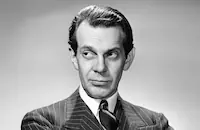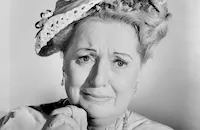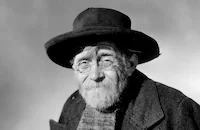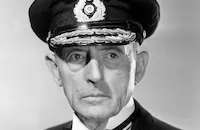Dangerously They Live

Brief Synopsis
Cast & Crew
Robert Florey
John Garfield
Nancy Coleman
Raymond Massey
Lee Patrick
Moroni Olsen
Film Details
Technical Specs

Synopsis
While Jane Greystone, a New York operative with British Intelligence, is en route to Grand Central Station with vital shipping information, she is kidnapped by a phony taxi driver named George. On the way, the taxi is involved in an accident and Jane and George are picked up by an ambulance staffed by Dr. Michael Lewis. Jane claims to be suffering from amnesia, and George relays this information to his superiors. One of them, Mr. Goodwin, arrives at the hospital claiming to be Jane's father and brings with him Dr. Ingersoll, a specialist in amnesia and the real head of the spies. Jane tells Mike that Goodwin is not her father, but rather is a man determined to learn the secret she possesses. Mike does not really believe her, but nonetheless agrees to help her. When Goodwin insists on placing Jane under Ingersoll's care at his home, Jane begs Mike to accompany them. At the Goodwins', Mike soon realizes that he is being carefully guarded. His call to the hospital is monitored and he is not allowed to leave the grounds. When he notices a gun in the butler's pocket, he understands that he and Jane are prisoners. Soon, Ingersoll discovers that Jane does not have amnesia, and Mike is forbidden to see her alone. That night, Jane is drugged at dinner and Ingersoll injects her with a truth serum but she does not reveal her secret. In the meantime, Mike manages to escape and summons the sheriff, but when they arrive at the Goodwins', the house is deserted except for Ingersoll. Ingersoll suggests that Mike take his story to his old friend the district attorney and there convinces the district attorney that Mike is paranoid and should be committed. For a fee, one of Mike's jailers offers to help him escape, but outside, two of Ingersoll's thugs are waiting to take him to a secret headquarters inside Steiner's delicatessen. When Steiner tries to stop Goodwin and his men from executing their plans, he is killed. Jane then agrees to tell the spies what they want to know. Meanwhile, Mike overcomes his guard and pretends to be dead. After the spies transmit Jane's information to some waiting U-boats, she confesses that she lied. They are about to kill her when Mike breaks into the room, thus allowing Jane to telephone her contacts. On her advice, they dispatch fighter airplanes to the U-boats' location and the boats are destroyed. Jane and Mike are now free to admit their love for each another.

Director

Robert Florey
Cast

John Garfield

Nancy Coleman

Raymond Massey

Lee Patrick

Moroni Olsen
Esther Dale

John Ridgely

Christian Rub

Frank Reicher
Ben Weldon
Cliff Clark
Roland Drew
Arthur Aylesworth
John Harmon
Matthew Boulton
Gavin Muir
Ilka Gruning
Frank M. Thomas
James Seay
Glen Cavender
Adolph Milar
Marijo James

Charles Drake

Juanita Stark
Joan Winfield
Audra Lindley
Leah Baird

Jack Mower
Sol Gorss
Dick Wessell
Michael Ames
Murray Alper
Henry Victor
Henry Rowland
Ann Edmonds
Leslie Denison
Sven Borg
Spec O'donnell
Bud Mccallister
Hans Von Morhart
Crew
Milo Anderson
Bryan Foy
Les Guthrie
Harold Mclernon
L. Wm. O'connell
Marion Parsonnet
Hugh Reticker
C. A. Riggs
Ben Stoloff
Perc Westmore
Harold Winston

Film Details
Technical Specs

Articles
Dangerously They Live
What changed Garfield's mind about the job may never be known, nearly fifty years after the mercurial actor's premature death by heart attack in 1952, but the politics informing Marion Parsonnet's script likely played a factor. A member of the Hollywood Anti-Nazi League well before America's entry into World War II in December 1941, Garfield would have warmed to the film's uncompromising depiction of German agents wreaking havoc in the free world. With director Robert Florey at the helm, Remember Tomorrow went before the cameras in September 1941. Instead of Priscilla Lane as his leading lady, Nancy Coleman was cast opposite Garfield, as a British operative feigning amnesia to evade enemy agents Raymond Massey, Moroni Olsen and Lee Patrick on the grounds of a New York sanitarium. (However disappointed Lane may have been to lose the role to Coleman, the actress starred the following year in Alfred Hitchcock's wartime espionage thriller "Saboteur" [1942].) Between the end of principal photography and the film's Christmas Eve premiere, the Japanese Imperial Navy, in league with Adolf Hitler's Third Reich, bombed the American Naval Base at Pearl Harbor; four days later, Hitler declared war on the United States.
General release of the retitled Dangerously They Live was delayed for two months as the American military mobilized for combat. (Warner Brothers did not even file a copyright on the film until February 1942.) Deemed then as now a minor vehicle for rising star Garfield, the film won only scattershot praise from the critics of the day for Florey's direction and the assembled talent. In his April 11, 1942 New York Times review, Bosley Crowther allowed that Garfield "plays the single-handed hero in this instance with cool and square-jawed conviction, while Raymond Massey and Moroni Olsen are as slick a pair of Nazis as there is--in the Screen Actors Guild, of course."
For his part, Garfield never looked back. He spent the remaining months of 1941 touring military bases in the Caribbean in the company of Laurel and Hardy, Chico Marx and Ray Bolger. Despite his liberal politics (which would get him into considerable trouble throughout the decade), Garfield proved his dedication to American servicemen by helping to found with Bette Davis the Hollywood Canteen, in which soldiers bound for or returning from war could enjoy dinner and entertainment provided exclusively by volunteers from the entertainment industry.
Producer: Bryan Foy (uncredited)
Director: Robert Florey
Screenplay: Marion Parsonnet
Cinematography: L. Wm. O'Connell
Art Direction: Hugh Reticker
Film Editing: Harold McLernon
Cast: John Garfield (Dr. Michael 'Mike' Lewis), Nancy Coleman (Jane Graystone), Raymond Massey (Dr. Ingersoll), Lee Patrick (Head Nurse Johnson), Moroni Olsen (Mr. John Goodwin), Esther Dale (Dawson, Goodwin's Housekeeper), John Ridgely (John, Nazi Henchman), Christian Rub (Mr. Steiner), Frank Reicher (Jarvis, Goodwin's Butler), Ben Welden (Eddie, Nazi Henchman).
BW-77m.
by Richard Harland Smith
Sources:
He Ran All the Way: The Life of John Garfield by Robert Nott (Limelight Editions, 2004)
John Garfield: The Illustrated Career in Films and Onstage by Patrick J. McGrath (McFarland & Company, 2006)

Dangerously They Live
Quotes
Trivia
Notes
The film's working title was Remember Tomorrow. A pre-production press release included in the file on the film at the AMPAS Library announced that the film would star Priscilla Lane and Richard Whorf.















